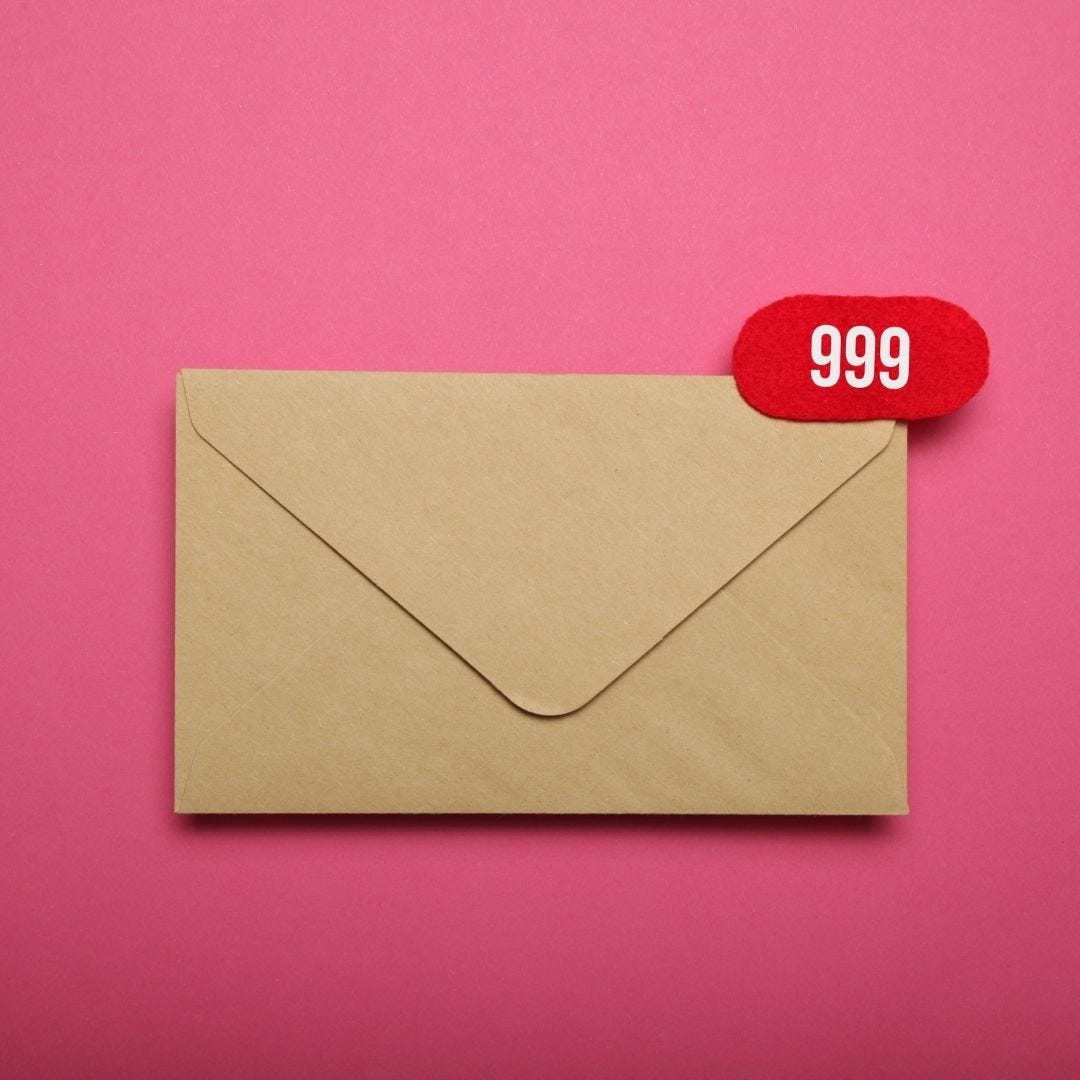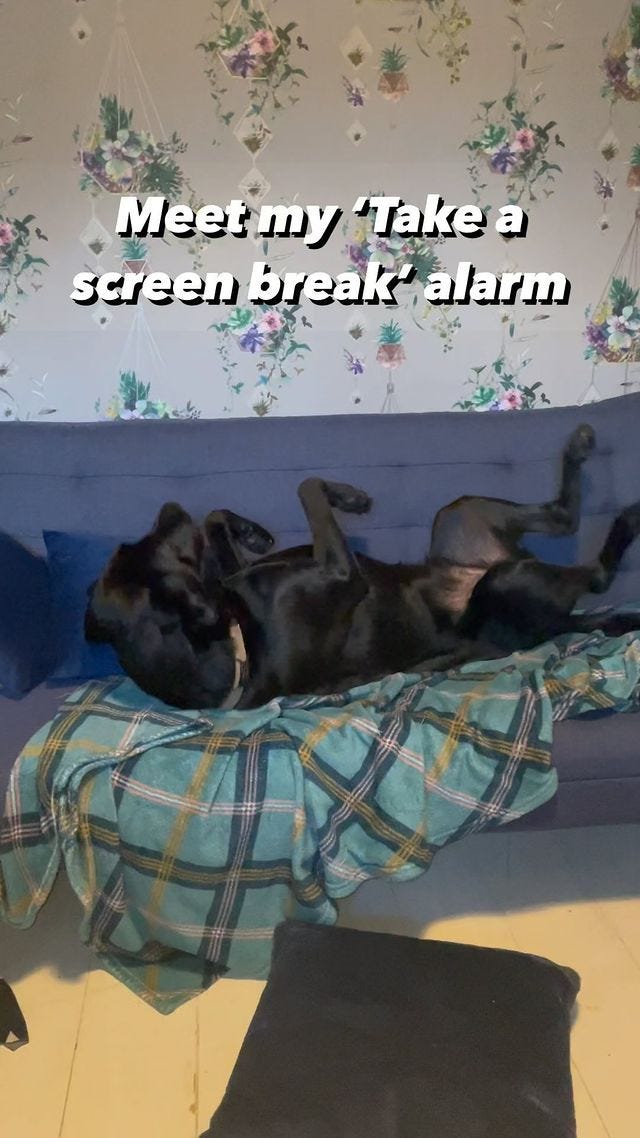Emails are such a part of daily life now, it’s rare anyone is at ‘inbox zero’, and it seems like we just get so many, doesn’t it?
I know I do.
And I worry about how they impact our mental health, and about how they impact our ability to do the work we want and need to do. It’s quite creepy the way email is like someone poking you (often repeatedly) about something that is very much NOT on your to-do list. As if it’s going ‘Whatyoudoingwhatyoudoingwhatyoudoing?’
But it’s on the sender’s to-do list, hence them throwing their agenda into your inbox.
I can’t remember where I first heard that quote, that ‘Your inbox is full of other people’s agenda’ but it’s stuck with me ever since.
I spend a lot of my time on email, and I suspect you do, too. It’s forever refilling, like a magic cup that, however much I try to empty it, or drink from it, just keeps topping itself up.
Especially at this time of year - if I’m not getting Black Friday deals, it’s notes and missives about not missing out on something that will CHANGE MY LIFE if I don’t subscribe or sign up.
Emails are a funny thing - they are the electronic equivalent of the ‘post’, and traditionally, the post only arrives once a day. I think when I was little, there were two ‘posts’ a day, ahhhhh… the good old days.
In fact, I can remember a life before email. I remember when we first got it, and we’d email each other at uni, often from computers in the same room. We didn’t have laptops or smart phones which fed us emails every single second of the day and night.
When I started as a junior reporter at the Surrey Advertiser newspaper in Guildford, we didn’t have email addresses. We had one shared computer which had access to the internet, and we had phones on our desks, address books for contacts and actual physical spikes for putting paper we’d used on (like old press releases).
If we wanted to know something, to get in touch with someone, to find out information, we either rang up, or we went and knocked on a door. We went to events with business cards, rather than LinkedIn QR codes.
We produced a newspaper week in, week out, without using email.
So why now does it seem to consume my very days?
We’ve become really throwaway with our emails, seeing them as an instant way of making connections, yes, but also demands.
Once an email is sent it feels like the action is off your to-do list, that it’s then in someone else’s inbox you can move on to the next thing.
I get lots of emails from PRs, of course, offering research or people to speak to. Often, I can get up to three or four follow ups, along the lines of ‘Wondering if you saw this, if it’s of interest?’
It’s funny because while it is, of course, polite to reply, when it’s unsolicited, is this akin to someone following up three times on some junk email they’ve sent to my home?
Why is it assumed that because someone sends you an email, you HAVE to reply?
Their agenda is to know whether you’re interested, but is it necessary for you to help them with that, each and every time?
It’s important to not see other forms of communication as a way of avoiding email and therefore thinking that we’re not emailing so much. By that I mean sending slack or team messages. If email is the junk mail through the letter box, teams can be like someone cold calling at the door and ringing on the doorbell over and over again, each time with one short question or statement.
PING! Hey, my agenda wants you! DING! I need something, so you have to help me make it happen!
The other thing to remember is that you do this, too. We all do - we land in other people’s inboxes and expect to have our agenda helped, supported and met.
I’m hoping that, while this is of course partly my agenda (I want people to read my substack, to share, to subscribe, to think ‘Ooh, I need a coach, I’ll contact Jenny’) but that’s it. It’s not so much an agenda as a ‘what do you think?’
I hope you’ll open this when it’s right for you, not when it lands (unless the topic is super pertinent and you love my writing, of course).
My agenda is to collaborate, to share ideas, to be part of a community where my experience, knowledge and skills make a difference.
Four things you can do to shift the onus onto your agenda:
Only open the email when you have time to consider it. Just like a regular letter. Don’t open and then walk away. Wait to open.
Set a ‘pending’ out of office. You could say that you only check emails at certain times of day, or that you are on client or work deadlines.
Remember that ignoring is ok. Not ghosting once you have a chat going, but ignoring unsolicited emails that are not your agenda.
Say thanks but no thanks. Cut it off at the pass. If they ‘NEED’ you to do something, but you can’t or know that you don’t need to do it, then a polite no is not rude, it’s actually quite polite.
Thanks for reading! Here’s Roger the Labrador for your viewing pleasure:






The two times post was absolutely real — my dad, an IRL former postman, informs me so and I have a very vague memory of this!